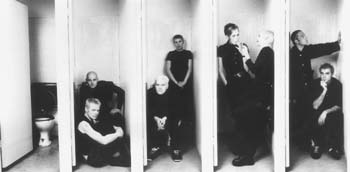
Casey Orr
Stall of the Wild: The ideologues in Chumbawamba have found a niche all their own: catchy tunes with overt political themes.
Chumbawamba and Moby both put their messages before their music
By Gina Arnold
IN THE LINER NOTES to his latest album, I Like to Score (Elektra), DJ, producer, musician and theoretician Moby complains that so-called cultural conservatives often conflate ethics and aesthetics. His advice? They should "cultivate an approach to values that's based on principles rather than aesthetics."
To interpret Moby's musings, it helps to know that by "aesthetics" he apparently really means something like "lifestyles." In contrast to conservatives who think that alternative lifestyles can't be ethical, Moby believes "If someone's gay, let them be gay."
True enough--if one takes cultural conservatives to mean people with conservative values. Another way of reading the term, however, is "people who don't like Moby's electronic-based music." Then the implication is that listeners should ignore the flaccidity of Moby's versions of Mission of Burma's "That's When I Reach for My Revolver" and Joy Division's "New Dawn Fades" merely because he is so ethical.
This, of course, is an absurd supposition. After all, just because one hates Guns n' Roses for their sexism doesn't mean one then has to like Moby for his lack of it. Unfortunately, however, Moby's verbose, confusing New Age liner tirade lends itself to just such a misunderstanding.
Such are the pitfalls of mixing politics with music. Moby, who is often billed as a "vegan-Christian-philosopher," has fallen headlong into this trap time and again, thanks to his earnest, but easily ridiculed, pronouncements: "Poverty can be bad, but it can also be fine" (from the I Like to Score liner notes), for instance, or "It's hard to be human."
Moby has also written that any pronouncements "on the values of others :... need to be cautious, pragmatic, logical and not just the typically hateful and reactionary vacuities that we have grown so accustomed to." But when applied to music, this argument that ethics validate aesthetics is flawed, as is proven by the new album Tubthumper (Revolution Records), by Britain's premier radical leftist agitpop band Chumbawamba.
LIKE MOBY, Chumbawamba consists of nonsmoking, nondrinking vegans with a pseudoreligious bent--only their religion happens to be politics, and it is a lot more fervent and upfront than Moby's. In fact, few bands are more flagrantly ideologically motivated than Chumbawamba, even though the group's music does not sound conventionally political--folky, punky or thrash. Instead, Chumbawamba is a mildly rhythmic English pop band whose music is so catchy it's easy to ignore its message.
The band's hugely popular new single, "Tubthumping"--which is set in a bar where a drunken prole is belting out "the songs that remind him of the good times"--is probably meant as a diatribe against alcohol abuse. But because a lilting chorus of "Danny Boy" elevates the song's chanted verses into a joyous sing-along, "Tubthumping" is something else entirely. Instead of expressing proletariat angst, it is the perfect evocation of drunken bonhomie--and easily one of the most misunderstood songs of the decade.
Truly, the mere fact that the confirmed anarchists of Chumbawamba have a hit is utterly ironic--a tribute to the band's artistic growth and to its longevity. In the past 12 years, its songs have been split between clunky parodies (Pictures of Starving Children Sell Records, a concept LP ridiculing Live Aid, for example) and strident rants with titles such as "Homophobia," "Timebomb," "Criminal Injustice" and even "Ugh! Your Ugly Houses!"
Tubthumper also takes social injustice as its text, but although the lyrics boast a lot of sputtering indignation, the album isn't nearly as dogmatic as previous releases. "One by One," for example, is a pompous little number about a Liverpool dock workers' strike that starts out like a hymn. Better is "The Big Issue" (named for the British equivalent of The Street Sheet), a song about homelessness with a particularly apt description of one unfortunate as "skating frozen chaos / Till the no-good gods are dead."
The album also includes elaborate sleeve notes with quotes by a host of "radical" thinkers--among them Jerry Rubin, Baudelaire, Plato and Malcolm McLaren--as well as the inevitable bit of Parisian graffiti: "I declare a permanent state of happiness." (The notes have to be sent for or looked up on the Internet--because the band couldn't get clearance for the quotes.)
Like Moby, Chumbawamba means well and definitely provides food for thought. But few things are more irritating than a band that wants to educate its audience--whether the proselytizing is relegated to liner notes or included in the lyrics. Political rock is invariably didactic and boring and almost impossible to pull off without sounding dogmatic, smug, self-righteous or strident.
That these acts have even made an attempt to be political is notable in these apathetic times, but in both cases, the music--the aesthetics--is much more enjoyable than the accompanying ethics. What would Mr. Moby say to that?
[ Metro | Metroactive Central | Archives ]
![[Metroactive Music]](/music/gifs/music468.gif)